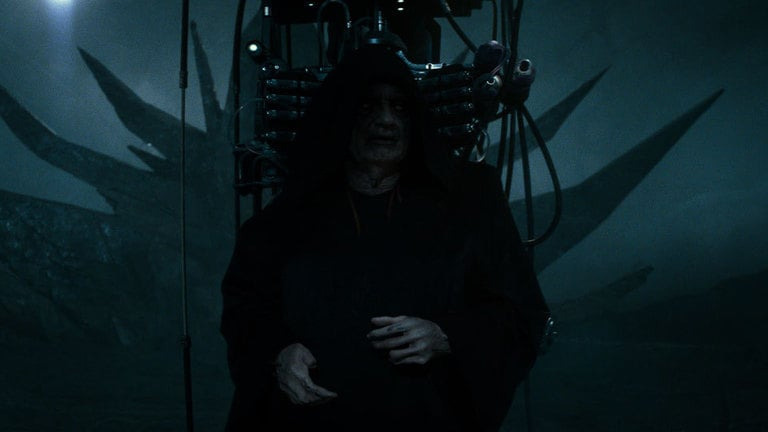Emperor Palpatine Confirmed To Be A Clone In 'Star Wars: The Rise Of Skywalker', Was Considered To Return In 'The Force Awakens'
We may receive a commission on purchases made from links.
The novelization of Star Wars: The Rise of Skywalker won't be available everywhere until March 17, but Lucasfilm Publishing made copies of the book available early at Chicago's C2E2 convention this past weekend. That means some of the revelations left out of the movie have started to surface online, and one of them explains a detail about returning villain Emperor Palpatine that would have been best explored on the big screen instead of in a book released after the fact.
It turns out that Emperor Palpatine is a clone in Star Wars: The Rise of Skywalker.
The excerpt from the Star Wars: The Rise of Skywalker novelization was posted at ScreenRant, and it comes early in the book when Kylo Ren arrives on Exegol and meets Palpatine in-person. The detail about Palpatine being a clone comes in the description of the machinery and equipment attached to Palpatine. Here it is:
All the vials were empty of liquid save one, which was nearly depleted. Kylo peered closer. He'd seen this apparatus before, too, when he'd studied the Clone Wars as a boy. The liquid flowing into the living nightmare before him was fighting a losing battle to sustain the Emperor's putrid flesh.
"What could you give me?" Kylo asked. Emperor Palpatine lived, after a fashion, and Kylo could feel in his very bones that this clone body sheltered the Emperor's actual spirit. It was an imperfect vessel, though, unable to contain his immense power. It couldn't last much longer."
This was alluded to in a more presumptive fashion by Dominic Monaghan's character Beaumont Kin after Poe Dameron confirms that somehow Emperor Palpatine has returned. Kin attempts to explain how this is possible by saying, "Dark science. Cloning. Secrets only the Sith knew." It's the most vague of explanations and that's all we're given. Don't forget that this comes after the revelation of Palpatine's return was relegated to the opening crawl of the movie.
Having Palpatine return as a clone isn't an entirely crazy idea. In fact, that's how the Emperor returned in the Expanded Universe stories that are now regarded as Legends, and it was something George Lucas was a fan of himself. However, the clone body in the Expanded Universe was not weak like the one in The Rise of Skywalker. But what's annoying is that no further explanation or details gave us any inkling as to how the Emperor returned, or how he was able to pull the strings of Kylo Ren, Supreme Leader Snoke, and the First Order, all from his weakened clone body. That's still pretty frustrating.
Emperor Palpatine Almost Returned in The Force Awakens
It turns out there might have been more of an explanation if director J.J. Abrams went a different route with Star Wars: The Force Awakens. In an excerpt from a recent Cinefex interview with visual effects supervisor Roger Guyett, the idea of Palpatine returning as a clone was revealed to be something that almost made it into the first chapter of this new trilogy instead of saving it for the finale. This fragment of the interview surfaced on Imgur (via ComicBook.com):
"[Actor] Ian [McDiarmid] was such a major part of the original films. J.J. wanted to bring him back to reveal that Palpatine wasn't completely destroyed in Episode VII. He created a clone of himself and, with the help of Sith loyalists, rebuilt himself to a fragmented and unstable state. When Kylo meets him, Palpatine is not fully formed, and he relies on tubes and mechanics, moving around this Sith laboratory on a mechanism that Kevin Jenkins designed. He has the spirit of the Sith, but he's trapped inside a body that's incomplete."
That sounds just like what we got in The Rise of Skywalker, so maybe J.J. Abrams telling everyone that he always wanted to bring back Palpatine isn't just a way to make that plot detail more acceptable. But honestly, knowing that this was something Abrams thought of from the beginning of the new trilogy didn't make it any easier to swallow. The execution still feels forced, and only would have added to the repetitive nature of the two films that Abrams directed in this new Star Wars trilogy. Yes, that ties into George Lucas' idea of symmetry in storytelling and visual poetry, but that doesn't automatically make it good. That might be why some Star Wars fans loved The Last Jedi so much and ended up being so disappointed in The Rise of Skywalker. But that's just something we have to accept now that the Skywalker saga is over.

